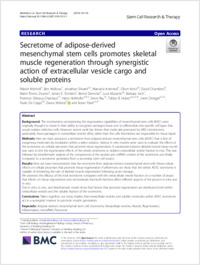Secretome of adipose-derived mesenchymal stem cells promotes skeletal muscle regeneration through synergistic action of extracellular vesicle cargo and soluble proteins
- Mitchell, Robert School of Biological Sciences, University of Reading, UK
- Mellows, Ben School of Biological Sciences, University of Reading, UK
- Sheard, Jonathan Stem Cell Biology and Regenerative Biology Group, School of Pharmacy, University of Reading, UK - Sheard BioTech Ltd, London, UK
- Antonioli, Manuela I.N.M.I. L Spallanzani IRCCS, Rome, Italy
- Kretz, Oliver Department of Medicine III, Faculty of Medicine University Medical Center Hamburg-Eppendorf, Hamburg, Germany - Renal Division, Medical Centre, Faculty of Medicine, University of Freiburg, Freiburg, Germany
- Chambers, David Wolfson Centre for Age-Related Diseases, King’s College, London, UK
- Zeuner, Marie-Theres Stem Cell Biology and Regenerative Biology Group, School of Pharmacy, University of Reading, UK
- Tomkins, James E. Stem Cell Biology and Regenerative Biology Group, School of Pharmacy, University of Reading, UK
- Denecke, Bernd Interdisciplinary Centre for Clinical Research Aachen, RWTH Aachen University, Germany
- Musante, Luca Centre for Bioanalytical Sciences (CBAS), Dublin City University, Ireland
- Joch, Barbara Department of Neuroanatomy, Institute for Anatomy and Cell Biology, Faculty of Medicine, University of Freiburg, Freiburg, Germany
- Debacq-Chainiaux, Florence URBC, Namur Research Institute for Life Science (NARILIS), University of Namur, Belgium
- Holthofer, Harry Centre for Bioanalytical Sciences (CBAS), Dublin City University, Ireland - FRIAS Freiburg Institute for Advanced Studies, University of Freiburg, Germany
- Ray, Steve Micregen, Alderley Edge, Manchester, UK
- Huber, Tobias B. Department of Medicine III, Faculty of Medicine University Medical Center Hamburg-Eppendorf, Hamburg, Germany - Renal Division, Medical Centre, Faculty of Medicine, University of Freiburg, Freiburg, Germany - FRIAS Freiburg Institute for Advanced Studies, University of Freiburg, Germany - BIOSS Centre for Biological Signalling Studies and Centre for Systems Biology (ZBSA), Albert-Ludwigs-University, Freiburg, Germany
- Dengjel, Jörn FRIAS Freiburg Institute for Advanced Studies, University of Freiburg, Germany - Department of Biology, University of Fribourg, Switzerland
- De Coppi, Paolo Stem Cells & Regenerative Medicine Section, UCL Great Ormond Street Institute of Child Health, London, UK
- Widera, Darius Stem Cell Biology and Regenerative Biology Group, School of Pharmacy, University of Reading, UK
- Patel, Ketan School of Biological Sciences, University of Reading, UK - FRIAS Freiburg Institute for Advanced Studies, University of Freiburg, Germany
-
05.04.2019
Published in:
- Stem Cell Research & Therapy. - 2019, vol. 10, no. 1, p. 116
English
The mechanisms underpinning the regenerative capabilities of mesenchymal stem cells (MSC) were originally thought to reside in their ability to recognise damaged tissue and to differentiate into specific cell types that would replace defective cells. However, recent work has shown that molecules produced by MSCs (secretome), particularly those packaged in extracellular vesicles (EVs), rather than the cells themselves are responsible for tissue repair.Methods: Here we have produced a secretome from adipose-derived mesenchymal stem cells (ADSC) that is free of exogenous molecules by incubation within a saline solution. Various in vitro models were used to evaluate the effects of the secretome on cellular processes that promote tissue regeneration. A cardiotoxin-induced skeletal muscle injury model was used to test the regenerative effects of the whole secretome or isolated extracellular vesicle fraction in vivo. This was followed by bioinformatic analysis of the components of the protein and miRNA content of the secretome and finally compared to a secretome generated from a secondary stem cell source.Results: Here we have demonstrated that the secretome from adipose-derived mesenchymal stem cells shows robust effects on cellular processes that promote tissue regeneration. Furthermore, we show that the whole ADSC secretome is capable of enhancing the rate of skeletal muscle regeneration following acute damage. We assessed the efficacy of the total secretome compared with the extracellular vesicle fraction on a number of assays that inform on tissue regeneration and demonstrate that both fractions affect different aspects of the process in vitro and in vivo. Our in vitro, in vivo, and bioinformatic results show that factors that promote regeneration are distributed both within extracellular vesicles and the soluble fraction of the secretome.Conclusions: Taken together, our study implies that extracellular vesicles and soluble molecules within ADSC secretome act in a synergistic manner to promote muscle generation.
- Faculty
- Faculté des sciences et de médecine
- Department
- Département de Biologie
- Language
-
- English
- Classification
- Biological sciences
- License
-
License undefined
- Identifiers
-
- RERO DOC 324627
- DOI 10.1186/s13287-019-1213-1
- Persistent URL
- https://folia.unifr.ch/unifr/documents/307812
Statistics
Document views: 153
File downloads:
- pdf: 262
